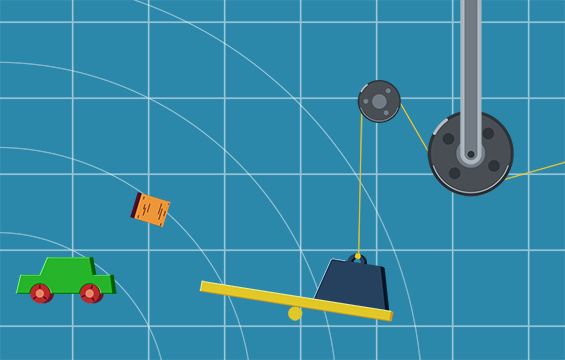Junior Scientists: Simple Machines

Get ready to think like an engineer
From wheels and axles to wedges and screws, learn about the simple machines we use in everyday life. When and why was the wheel invented? What do we use wedges for today? How do you make a perfect pulley system? Find out as you test different materials and work on your building skills from home during this exciting virtual program.
Program Details
- Live virtual program designed for children aged 5–10; all ages welcome
- Four live 90-minute sessions, one session per day
- Dates: November 20 & 27 and December 4 & 11
- 9 a.m. — Children ages 5–7
- 11 a.m. — Children ages 8–10
- Each session includes a live demonstration, at-home lab activity and craft to try at home
- Program cost: $105 including HST per family, or $95 for Planetary, Stellar, Galactic and Cosmic Members
Program Schedule
Sunday, November 20: Wheels & Axles
Learn what a force is and how much work goes into moving a heavy object. Explore the many uses of wheels and axles, and then apply what you’ve learned to create your own toy car!
Sunday, November 27: Pulleys and Inclined Planes
Prepare to elevate your knowledge by learning about pulleys and inclined planes. Investigate how the angle of an inclined plane makes all the difference in moving heavy things. Then, put your new knowledge to work as you make your very own mini well.
Sunday, December 4: Wedges & Screws
Explore how farmers use wedges and screws to plant and harvest. Investigate how wedges work by testing and comparing wedges at home, and then build your own mini helicopter.
Sunday, December 11: Levers
Lean into the world of levers as you explore their various types and classes. After you learn how to create an efficient first-class lever, it’s time to build your own pom-pom launcher!
Note: This program is back by popular demand! Book by November 16 to secure your spot.
As with all virtual Science Centre programming, adult supervision is required for all Junior Scientists sessions. Participants will be able to ask questions and engage with each other and Science Centre staff using the chat function of Zoom, though cameras will be off for privacy reasons.
Event capacity is limited, and registration will be available on a first-come, first-served basis. After you have registered, you will receive a Zoom link, activity PDF and materials list for each session via email at least one day in advance. To ensure each session begins and ends on time, please log on 5 to 10 minutes before your session’s start time.